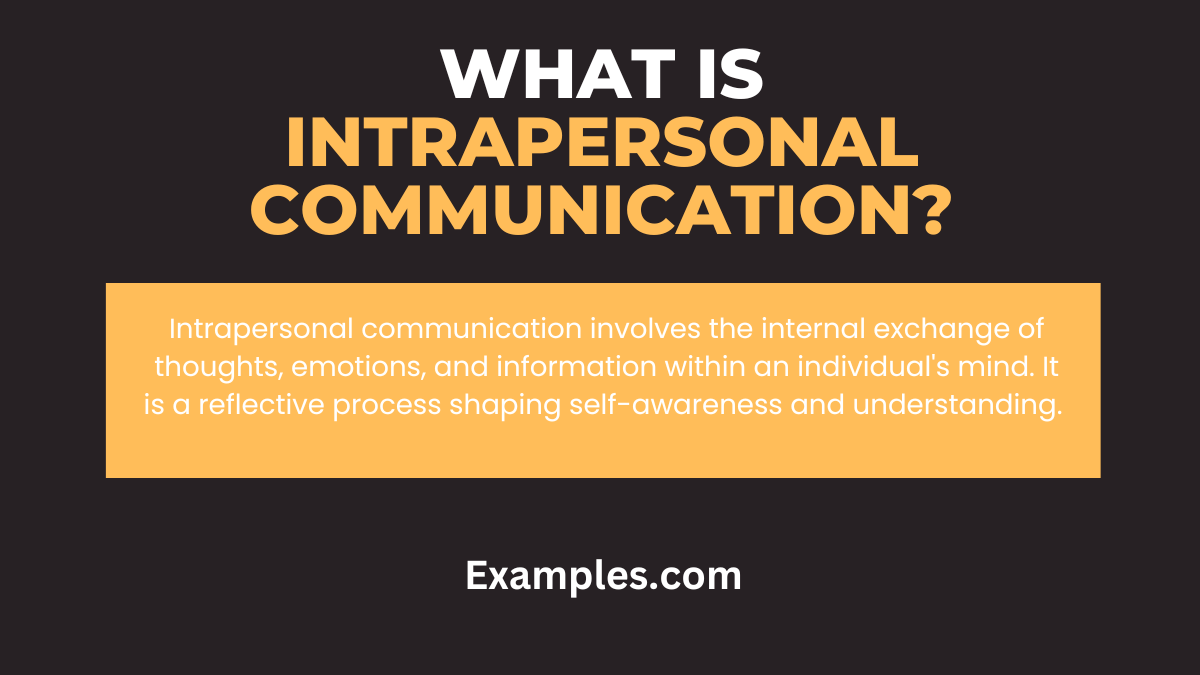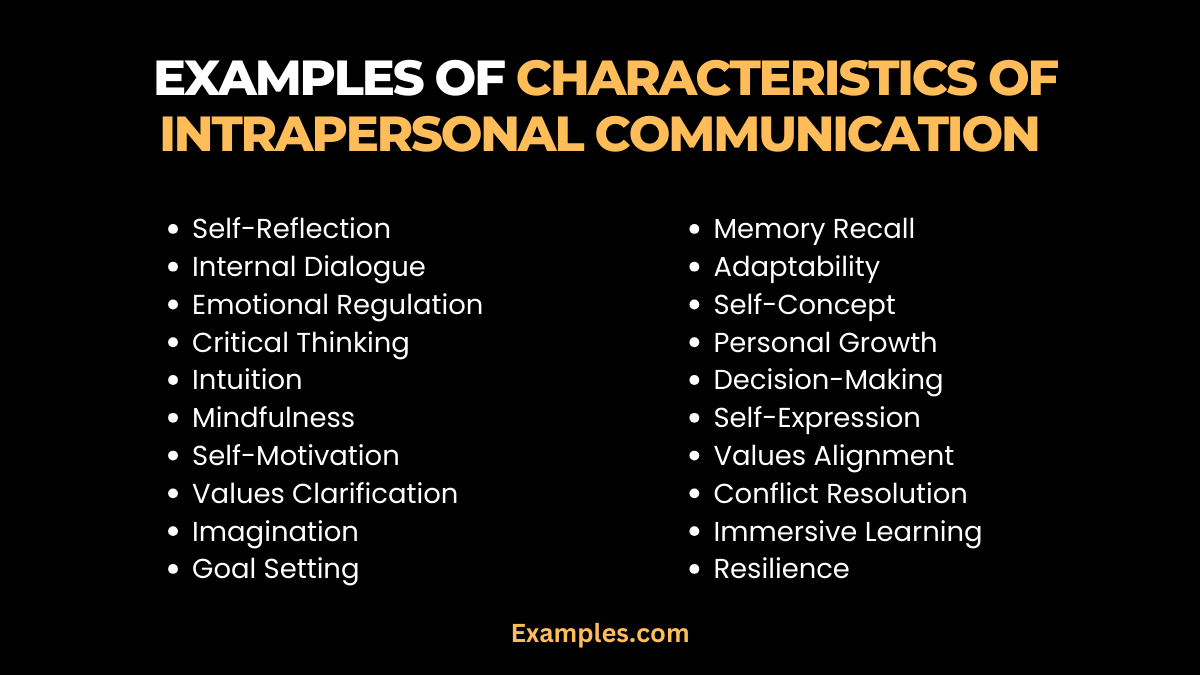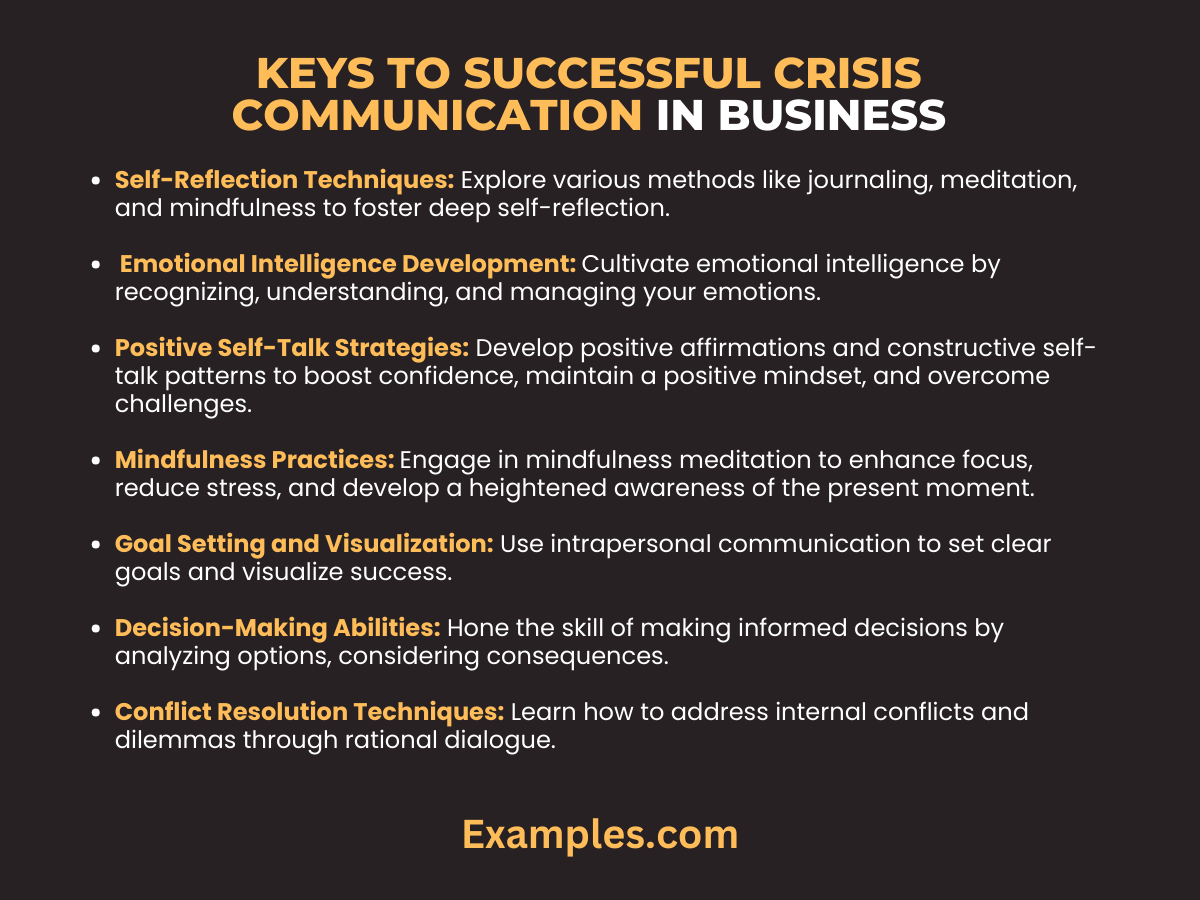Characteristics of Intrapersonal Communication
Delve into the fascinating realm of Characteristics of Intrapersonal Communication, a multifaceted exploration of self-dialogue. Uncover the definition, historical evolution, and essential tips, as we decipher the origins of this unique communication form. From introspective skills to practical advice, this comprehensive guide navigates the intricacies of intrapersonal communication, offering a roadmap to enhance self-awareness, personal growth, and effective internal dialogue.
What is Intrapersonal Communication?

Intrapersonal communication involves the internal exchange of thoughts, emotions, and information within an individual’s mind. It is a reflective process shaping self-awareness and understanding. This form of communication allows individuals to analyze experiences, make decisions, and establish a connection with their inner selves. Understanding intrapersonal communication is crucial for personal development, decision-making, and maintaining a harmonious balance between thoughts and actions.
20 Examples Of Characteristics Of Intrapersonal Communication

Unveil the nuances of intrapersonal communication’s defining traits, from self-reflection to internal dialogue.
- Self-Reflection: Contemplating personal experiences and emotions, fostering self-awareness and growth.
- Internal Dialogue: Engaging in inner conversations, influencing decision-making and cognitive processes.
- Emotional Regulation: Managing and understanding one’s emotions for improved mental well-being.
- Critical Thinking: Evaluating thoughts and ideas independently, enhancing problem-solving skills.
- Intuition: Trusting gut feelings and instincts, guiding decision-making beyond logical reasoning.
- Mindfulness: Being present and attentive to thoughts, promoting mental clarity and focus.
- Self-Motivation: Cultivating inner drive and determination for achieving personal goals.
- Values Clarification: Defining personal beliefs and principles, guiding decision-making aligned with core values.
- Imagination: Harnessing creative thinking to envision possibilities and alternatives.
- Goal Setting: Establishing clear objectives, channeling efforts towards personal and professional achievements.
- Memory Recall: Retrieving and processing stored information, aiding learning and problem-solving.
- Adaptability: Flexibly adjusting thoughts and attitudes in response to changing circumstances.
- Self-Concept: Forming a holistic view of oneself, shaping identity and confidence.
- Personal Growth: Continuously evolving and learning from experiences for self-improvement.
- Decision-Making: Weighing options and consequences internally to arrive at well-informed choices.
- Self-Expression: Clarifying thoughts and emotions for effective external communication.
- Values Alignment: Ensuring actions align with personal values, fostering authenticity.
- Conflict Resolution: Strategizing solutions to internal conflicts, promoting emotional harmony.
- Immersive Learning: Internalizing knowledge through reflective engagement for deeper understanding.
- Resilience: Bouncing back from challenges, cultivating mental strength and perseverance.
What Are Intrapersonal Communication Skills?

Intrapersonal communication skills refer to the ability to engage in effective internal dialogues and understand one’s thoughts, emotions, and motivations. These skills play a crucial role in self-awareness, personal development, and overall well-being. Here’s a comprehensive guide to enhancing and leveraging intrapersonal communication skills:
- Self-Reflection Techniques: Explore various methods like journaling, meditation, and mindfulness to foster deep self-reflection. Understand personal strengths, weaknesses, and areas for growth.
- Emotional Intelligence Development: Cultivate emotional intelligence by recognizing, understanding, and managing your emotions. This skill is vital for navigating complex social and professional situations.
- Positive Self-Talk Strategies: Develop positive affirmations and constructive self-talk patterns to boost confidence, maintain a positive mindset, and overcome challenges.
- Mindfulness Practices: Engage in mindfulness meditation to enhance focus, reduce stress, and develop a heightened awareness of the present moment.
- Goal Setting and Visualization: Use intrapersonal communication to set clear goals and visualize success. This helps in maintaining motivation and working towards desired outcomes.
- Decision-Making Abilities: Hone the skill of making informed decisions by analyzing options, considering consequences, and aligning choices with personal values.
- Conflict Resolution Techniques: Learn how to address internal conflicts and dilemmas through rational dialogue, leading to a more peaceful and harmonious inner state.
- Stress Management Strategies: Develop effective stress management techniques, such as deep breathing, progressive muscle relaxation, or other coping mechanisms tailored to your preferences.
- Creative Problem Solving: Cultivate creativity in solving personal challenges through innovative and imaginative thinking. This skill contributes to adaptability and resilience.
- Personal Growth Journaling: Keep a journal to record thoughts, experiences, and insights. Track personal development and identify patterns that contribute to growth.
What Are The 5 Elements Of Intrapersonal Communication?
Intrapersonal communication, the dialogue that occurs within oneself, comprises five key elements essential for personal growth and effective self-expression. Dive into a comprehensive exploration of these crucial elements:
- Self-Reflection: Delve into the significance of self-reflection as a fundamental element of intrapersonal communication. Learn how introspection contributes to self-awareness and personal development.
- Emotional Regulation: Explore the role of emotional regulation in intrapersonal communication, understanding how managing emotions enhances emotional intelligence and well-being.
- Mindfulness Practices: Uncover the benefits of mindfulness practices in fostering clarity, focus, and stress reduction. Learn techniques for incorporating mindfulness into daily life.
- Goal Setting: Examine the importance of goal setting as a powerful element in intrapersonal communication. Understand how clear objectives motivate and guide personal growth.
- Decision-Making Strategies: Discover the intricacies of decision-making within intrapersonal communication. Explore strategies for evaluating choices, making informed decisions, and navigating uncertainties.
What Are The Five Characteristics Of Intrapersonal Communication
Intrapersonal communication embodies an individual’s internal dialogue, thoughts, and self-reflection. Understanding its five key characteristics sheds light on the nuances and significance of this personal interaction.
- Internal Dialogue and Reflection
Intrapersonal communication primarily involves inner dialogues, introspection, and reflective thinking. Individuals engage in self-talk to evaluate emotions, make decisions, and weigh personal beliefs. - Self-Awareness and Emotional Intelligence
It’s characterized by heightened self-awareness, understanding personal emotions, motivations, and recognizing how they influence behaviors and decisions. - Mental Imagery and Visualization
Intrapersonal communication often utilizes mental imagery to envision goals, aspirations, scenarios, and plans, contributing to clearer goal-setting and problem-solving. - Mindfulness and Mindset
It encompasses mindfulness practices that aid in staying present, managing stress, and nurturing a positive mindset, fostering better decision-making and emotional regulation. - Personal Growth and Development
Intrapersonal communication promotes continuous self-improvement, encouraging individuals to journal, set personal goals, and analyze dreams for self-discovery and growth.
In conclusion, mastering the intricacies of intrapersonal communication is paramount for personal growth. The journey through internal dialogues, emotional intelligence, visualization, mindfulness, and self-development empowers individuals to navigate life’s complexities with resilience and self-awareness. Embrace these characteristics to foster a richer inner dialogue, unlocking the keys to enhanced communication skills and a more profound understanding of oneself.



